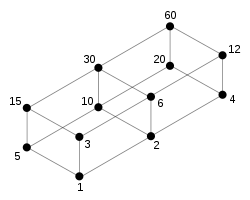Equidigital number
In number theory, an equidigital number is a natural number in a given number base that has the same number of digits as the number of digits in its prime factorization in the given number base, including exponents but excluding exponents equal to 1.[1] For example, in base 10, 1, 2, 3, 5, 7, and 10 (2 · 5) are equidigital numbers (sequence A046758 in the OEIS). All prime numbers are equidigital numbers in any base.

Demonstration, with Cuisenaire rods, that the composite number 10 is equidigital: 10 has two digits, and 2 · 5 has two digits (1 is excluded)
A number that is either equidigital or frugal is said to be economical.
Mathematical definition
Let be a number base, and let be the number of digits in a natural number for base . A natural number has the integer factorisation
and is an equidigital number in base if
where is the p-adic valuation of .
gollark: .
gollark: I thought it was 1 bit per sample
gollark: I've listened to CDs before, but not recently enough to compare well with compressed audio... hmm.
gollark: Well, sure, but diminishing returns.
gollark: I can detect the difference between DFPWM and whatever YouTube uses, but I'm not sure I've ever *heard* lossless audio.
See also
Notes
- Darling, David J. (2004). The universal book of mathematics: from Abracadabra to Zeno's paradoxes. John Wiley & Sons. p. 102. ISBN 978-0-471-27047-8.
References
- R.G.E. Pinch (1998), Economical Numbers.
This article is issued from Wikipedia. The text is licensed under Creative Commons - Attribution - Sharealike. Additional terms may apply for the media files.
